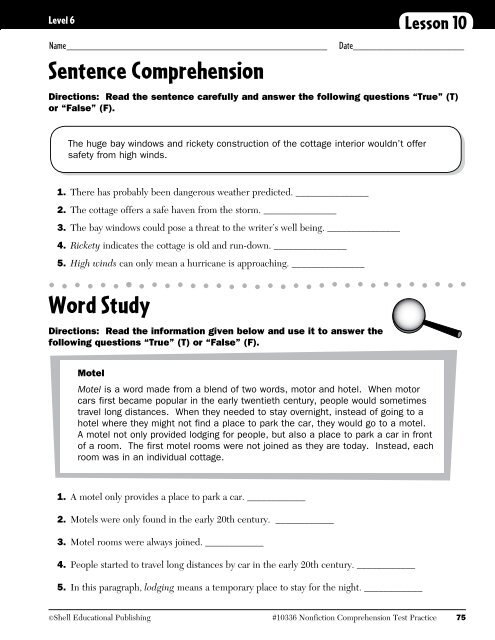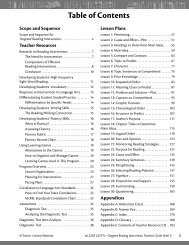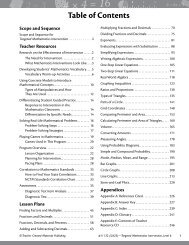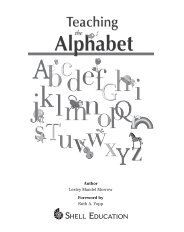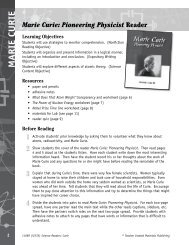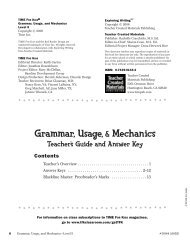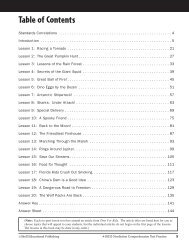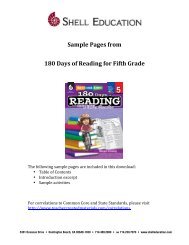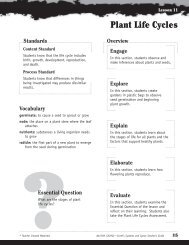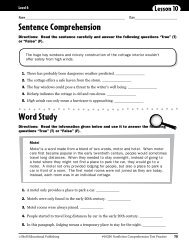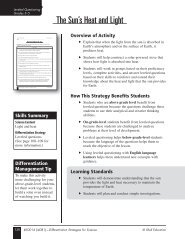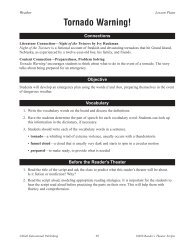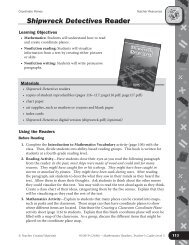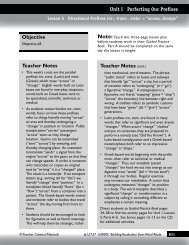Race the Wind, Grades 6-6 - Teacher Created Materials
Race the Wind, Grades 6-6 - Teacher Created Materials
Race the Wind, Grades 6-6 - Teacher Created Materials
Create successful ePaper yourself
Turn your PDF publications into a flip-book with our unique Google optimized e-Paper software.
Level 6<br />
Sentence Comprehension<br />
Directions: Read <strong>the</strong> sentence carefully and answer <strong>the</strong> following questions “True” (T)<br />
or “False” (F).<br />
The huge bay windows and rickety construction of <strong>the</strong> cottage interior wouldn’t offer<br />
safety from high winds.<br />
1. There has probably been dangerous wea<strong>the</strong>r predicted. _______________<br />
2. The cottage offers a safe haven from <strong>the</strong> storm. _______________<br />
3. The bay windows could pose a threat to <strong>the</strong> writer’s well being. _______________<br />
4. Rickety indicates <strong>the</strong> cottage is old and run-down. _______________<br />
5. High winds can only mean a hurricane is approaching. _______________<br />
Word Study<br />
Directions: Read <strong>the</strong> information given below and use it to answer <strong>the</strong><br />
following questions “True” (T) or “False” (F).<br />
Motel<br />
Motel is a word made from a blend of two words, motor and hotel. When motor<br />
cars first became popular in <strong>the</strong> early twentieth century, people would sometimes<br />
travel long distances. When <strong>the</strong>y needed to stay overnight, instead of going to a<br />
hotel where <strong>the</strong>y might not find a place to park <strong>the</strong> car, <strong>the</strong>y would go to a motel.<br />
A motel not only provided lodging for people, but also a place to park a car in front<br />
of a room. The first motel rooms were not joined as <strong>the</strong>y are today. Instead, each<br />
room was in an individual cottage.<br />
1. A motel only provides a place to park a car. ____________<br />
2. Motels were only found in <strong>the</strong> early 20th century. ____________<br />
3. Motel rooms were always joined. ____________<br />
4. People started to travel long distances by car in <strong>the</strong> early 20th century. ____________<br />
5. In this paragraph, lodging means a temporary place to stay for <strong>the</strong> night. ____________<br />
Lesson 10<br />
Name _____________________________________________ Date ___________________<br />
©Shell Educational Publishing #10336 Nonfiction Comprehension Test Practice 75
Level 6 Lesson 10<br />
Name _____________________________________________ Date ___________________<br />
Paragraph Comprehension<br />
Directions: Read <strong>the</strong> paragraph below and answer <strong>the</strong> following questions.<br />
The waterspout literally skipped. And <strong>the</strong>n, like a monster of <strong>the</strong> night that is<br />
exposed to <strong>the</strong> sun, this monster of water began to disintegrate when it hit land. By<br />
<strong>the</strong> time it reached our cottage, it was nothing more than a strong gust of watercolored<br />
wind that pelted our bodies. The rest of <strong>the</strong> storm raged for an hour and<br />
<strong>the</strong>n simply blew away.<br />
1. Choose <strong>the</strong> best meaning for disintegrate.<br />
a. melt<br />
b. break apart<br />
c. blow away<br />
d. gust<br />
2. How did <strong>the</strong> waterspout move toward <strong>the</strong><br />
house?<br />
a. It blew.<br />
b. It pelted.<br />
c. It skipped.<br />
d. all of <strong>the</strong> above<br />
3. What is compared to a “monster of <strong>the</strong><br />
night”?<br />
a. <strong>the</strong> wind<br />
b. <strong>the</strong> cottage<br />
c. <strong>the</strong> sun<br />
d. <strong>the</strong> waterspout<br />
4. This “monster of <strong>the</strong> night” is to <strong>the</strong> sun as<br />
“<strong>the</strong> waterspout” is to<br />
a. <strong>the</strong> land.<br />
b. <strong>the</strong> monster.<br />
c. <strong>the</strong> cottage.<br />
d. <strong>the</strong> storm.<br />
5. Did <strong>the</strong> waterspout hit <strong>the</strong> cottage?<br />
a. Yes, but weakly.<br />
b. No, but a storm occurred.<br />
c. Yes, but everyone lived.<br />
d. No, <strong>the</strong> storm prediction was wrong.<br />
76 #10336 Nonfiction Comprehension Test Practice ©Shell Educational Publishing
ARTICLE FROM<br />
Lesson 10<br />
Name __________________________________________ Date __________<br />
Whole Story Comprehension<br />
Directions: Read <strong>the</strong> story below and answer <strong>the</strong> questions on <strong>the</strong> following page.<br />
<strong>Race</strong> <strong>the</strong> <strong>Wind</strong><br />
When <strong>the</strong> sand began kicking up and lashing our faces, I started to worry that maybe we had<br />
made a mistake. Maybe we should have left <strong>the</strong> beach.<br />
That afternoon, my dad had stood on <strong>the</strong> deck of our home and laughed as our neighbors<br />
packed up <strong>the</strong>ir cars and headed inland. They left to spend <strong>the</strong> night in motels or at friends’<br />
homes that were out of range of <strong>the</strong> approaching summer storm. My dad believed his family<br />
was made of stronger stuff.<br />
Challenging <strong>the</strong> wea<strong>the</strong>r that threatened to dampen our spirits, my sister, my mom, and I lit<br />
a fire on <strong>the</strong> beach. Dad told jokes and used sticks as skewers to roast marshmallows that<br />
tasted like <strong>the</strong> burned bark.<br />
Now, it was 6:30 p.m. and all laughter evaporated. Our eyes were drawn to <strong>the</strong> sky. A dark<br />
wall of clouds marched toward us. The red sunset bled through <strong>the</strong> storm clouds, turning<br />
<strong>the</strong> sky into a swirling torrent of dark fire. Below, <strong>the</strong> black waters of Lake Michigan grappled<br />
and slammed against each o<strong>the</strong>r as <strong>the</strong>y sent icy tendrils toward <strong>the</strong> sky. Both sky and lake<br />
appeared locked in a dangerous battle, and we were trapped in <strong>the</strong> middle.<br />
“Look!” My sister, Kim, spotted it first. Her tiny finger pointed toward <strong>the</strong> horizon. It was a<br />
waterspout, a tornado whose funnel was made of fresh water. It was headed straight for us.<br />
In a flash, we were all on our feet. My dad began mumbling, “It’s okay, it’s okay.” The wind<br />
started screaming and now we were running to <strong>the</strong> cottage. My mom stopped next to <strong>the</strong> front<br />
door. “Where can we go?” She shouted <strong>the</strong> question at my dad.<br />
Most cottages on this part of Lake Michigan had been built without basements. Ours was no<br />
exception. The huge bay windows and rickety construction of <strong>the</strong> cottage interior wouldn’t offer<br />
safety from high winds.<br />
I turned to look at <strong>the</strong> sky. Now it didn’t look beautiful. It looked deadly. This liquid sister of<br />
<strong>the</strong> tornado wouldn’t wait for us to get in <strong>the</strong> car and drive to safety.<br />
“Under <strong>the</strong> deck!” my dad yelled. We scrambled beneath <strong>the</strong> deck, pressing ourselves against<br />
<strong>the</strong> foundation of <strong>the</strong> cottage. Between <strong>the</strong> deck supports, we watched <strong>the</strong> approaching storm<br />
in silent terror.<br />
The 200-foot-high waterspout shot toward us, not in <strong>the</strong> lazy way of a wave, but as if it had<br />
been fired from a cannon <strong>the</strong> size of <strong>the</strong> sun.<br />
My dad shouted, “Hold on!” and something else I couldn’t hear over <strong>the</strong> screaming wind. I<br />
think he was praying.<br />
The spout sprinted over <strong>the</strong> final stretch of water, an animal eager to make <strong>the</strong> kill. It lunged<br />
over <strong>the</strong> crashing waves. It twisted through <strong>the</strong> blood-red sky, and <strong>the</strong>n it hit <strong>the</strong> beach.<br />
The waterspout literally skipped. And <strong>the</strong>n, like a monster of <strong>the</strong> night that is exposed to <strong>the</strong><br />
sun, this monster of water began to disintegrate when it hit land. By <strong>the</strong> time it reached our<br />
cottage, it was nothing more than a strong gust of water-colored wind that pelted our bodies.<br />
The rest of <strong>the</strong> storm raged for an hour and <strong>the</strong>n simply blew away.<br />
“Next time, we’ll stay inland at Grandma’s. Okay?” my dad said, tears of relief in his eyes. We<br />
all agreed that it would be a good idea.<br />
©Shell Educational Publishing #10336 Nonfiction Comprehension Test Practice 77
Level 6 Lesson 10<br />
Name _____________________________________________ Date ___________________<br />
Whole Story Comprehension (cont.)<br />
Directions: After you have read <strong>the</strong> story on <strong>the</strong> previous page, answer <strong>the</strong> questions<br />
below.<br />
1. How many people are braving <strong>the</strong> storm?<br />
a. two<br />
b. three<br />
c. four<br />
d. five<br />
2. Who first spotted <strong>the</strong> waterspout?<br />
a. Dad<br />
b. Mom<br />
c. <strong>the</strong> narrator<br />
d. Kim<br />
3. What is called “<strong>the</strong> liquid sister of a<br />
tornado”?<br />
a. <strong>the</strong> blood red sky<br />
b. <strong>the</strong> waterspout<br />
c. <strong>the</strong> water-colored wind<br />
d. Kim<br />
4. Which word does not give <strong>the</strong> reader <strong>the</strong><br />
feeling of <strong>the</strong> storm’s intensity?<br />
a. screaming<br />
b. deadly<br />
c. lunged<br />
d. dampen<br />
5. Where does <strong>the</strong> family go for safety from<br />
<strong>the</strong> storm?<br />
a. in <strong>the</strong> cottage<br />
b. away from <strong>the</strong> beach<br />
c. under <strong>the</strong> deck<br />
d. in <strong>the</strong> basement<br />
6. In paragraph 10, what does <strong>the</strong> author<br />
mean by “as if it had been fired from a<br />
cannon <strong>the</strong> size of <strong>the</strong> sun”?<br />
a. It was powerful and fast moving.<br />
b. It was spherical, like a cannon ball.<br />
c. It was heading straight for <strong>the</strong>m.<br />
d. It was dangerous.<br />
7. What caused <strong>the</strong> waterspout to lose power?<br />
a. strong gusts of wind<br />
b. hitting land<br />
c. crashing waves<br />
d. <strong>the</strong> final stretch of water<br />
8. What is <strong>the</strong> opposite of fear?<br />
a. apprehension<br />
b. terror<br />
c. anxiety<br />
d. relief<br />
78 #10336 Nonfiction Comprehension Test Practice ©Shell Educational Publishing
Level 6 Lesson 10<br />
Name _____________________________________________ Date ___________________<br />
Enrichment<br />
Directions: Read <strong>the</strong> information below and use it to answer <strong>the</strong> following questions.<br />
Personification<br />
The writer of this article used many interesting verbs to make <strong>the</strong> story come alive.<br />
The sand “kicks up” and “lashes.” A wall of clouds “marches.” The sunset<br />
“bleeds.” Waves “grapple” and “slam.” The wind “screams.” The spout<br />
“sprints.” It “lunges,” “twists,” and “skips.”<br />
The writer thinks of <strong>the</strong>se natural elements as living creatures. We call this way<br />
of writing personification. Personification is a figure of speech that gives animals,<br />
ideas, and non-living objects or ideas personality and emotions. The writer of<br />
“<strong>Race</strong> <strong>the</strong> <strong>Wind</strong>” even calls <strong>the</strong> waterspout “an animal eager for a kill” and “a<br />
monster of water.”<br />
In <strong>the</strong> sentences below, if <strong>the</strong> sentence contains personification, write “Yes” (Y); if it does not contain<br />
personification, write “No” (N).<br />
1. March shakes out her rain-soaked hair. ____________<br />
2. October is a very windy month. ____________<br />
3. War shook his angry fist at <strong>the</strong> poor peasants. ____________<br />
4. Peace is hard to achieve. ____________<br />
5. The rosy-fingered dawn smiles at <strong>the</strong> sailor. ____________<br />
6. Soccer is <strong>the</strong> king of sports. ____________<br />
7. Danger knows that we are scared. ____________<br />
8. Horseracing is <strong>the</strong> sport of kings. ____________<br />
9. She was cool from sleep. ____________<br />
10. The rain strikes and bites me. ____________<br />
©Shell Educational Publishing #10336 Nonfiction Comprehension Test Practice 79
Level 6 Lesson 10<br />
Name _____________________________________________ Date ___________________<br />
Graphic Development<br />
Directions: Use <strong>the</strong> information in <strong>the</strong> chart given below to choose <strong>the</strong> letter that best<br />
identifies <strong>the</strong> wind strength seen in <strong>the</strong> following situations.<br />
Strength<br />
F0<br />
F1<br />
F2<br />
F3<br />
F4<br />
F5<br />
<strong>Wind</strong> Speed (MPH)<br />
40–77<br />
78–112<br />
113–157<br />
158–206<br />
207–260<br />
260+<br />
Tornado Strength Chart<br />
Damage<br />
Shattered windows, broken branches<br />
Rips shingles from roofs, moves mobile homes<br />
Trees uprooted, mobile homes destroyed, roofs<br />
lifted off<br />
Turns over cars, blows down walls of houses<br />
Destroys homes, lifts and carries large objects<br />
Lifts homes off of foundations, damages steel<br />
structures<br />
Possible <strong>Wind</strong> Strengths<br />
a. F0 b. F1 c. F2 d. F3 e. F4 f. F5<br />
Percent<br />
69%<br />
Situations<br />
__________ 1. “The damage was devastating! I saw my car lifted right off <strong>the</strong> ground. The 240<br />
MPH winds turned my home into a heap of rubble.”<br />
__________ 2. “We heard <strong>the</strong> warnings and went right to <strong>the</strong> basement. We feel fortunate that<br />
our neighborhood only suffered some broken tree limbs. The damage was very<br />
light.”<br />
__________ 3. “When <strong>the</strong> tornado hit, it sounded like a freight train. The destruction was severe.<br />
Cars were turned over in <strong>the</strong> street. Reports say <strong>the</strong> wind speed was up to 180<br />
miles per hour.”<br />
__________ 4. “The tornado hit <strong>the</strong> Serenity Mobile Home Park. Many of <strong>the</strong> mobile homes were<br />
destroyed. Trees were uprooted. The Red Cross will arrive by nightfall.”<br />
_________ 5. “I lost most of <strong>the</strong> shingles on my garage roof. My lawn furniture was tossed<br />
around <strong>the</strong> yard.”<br />
80 #10336 Nonfiction Comprehension Test Practice ©Shell Educational Publishing<br />
29%<br />
2%


